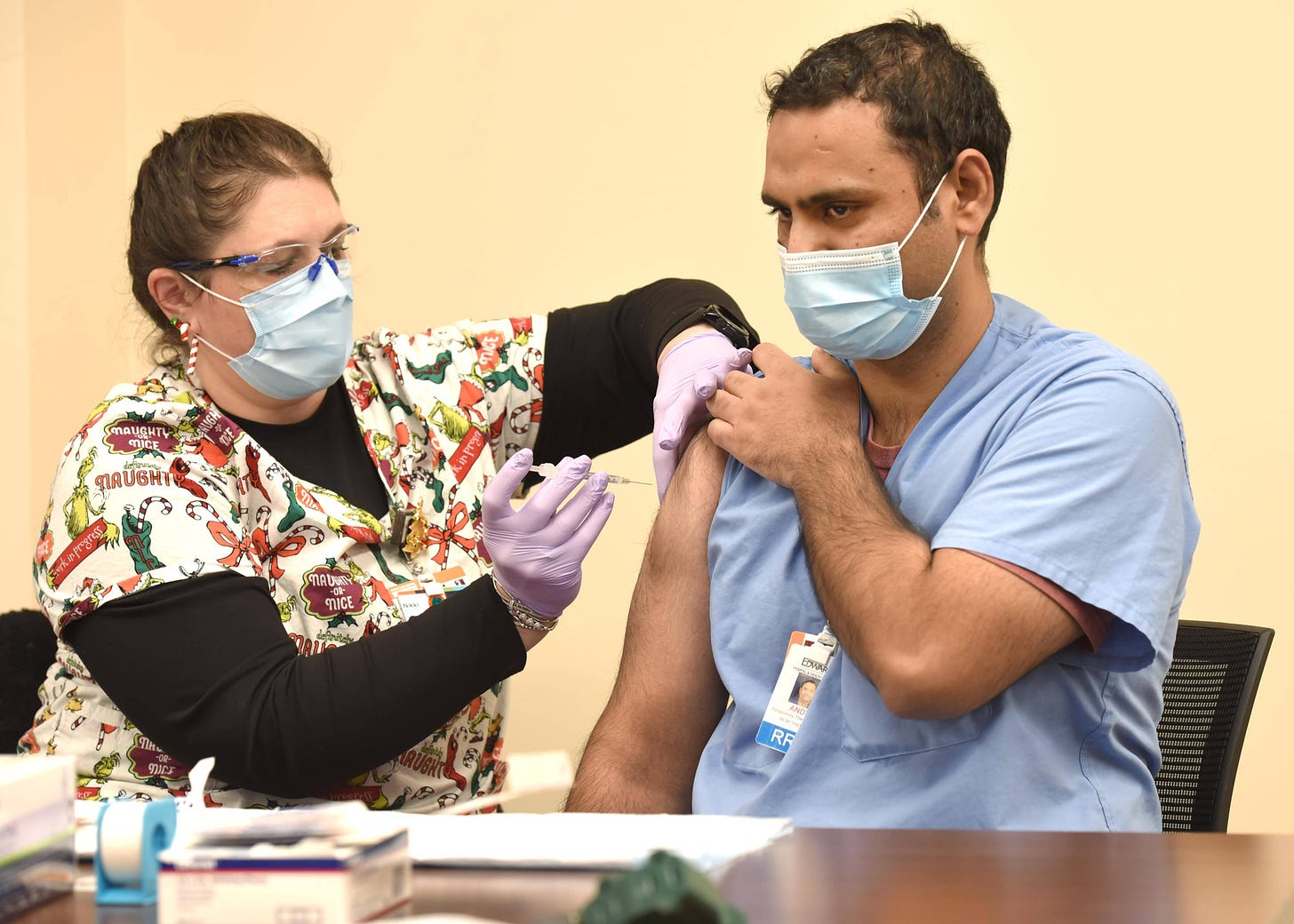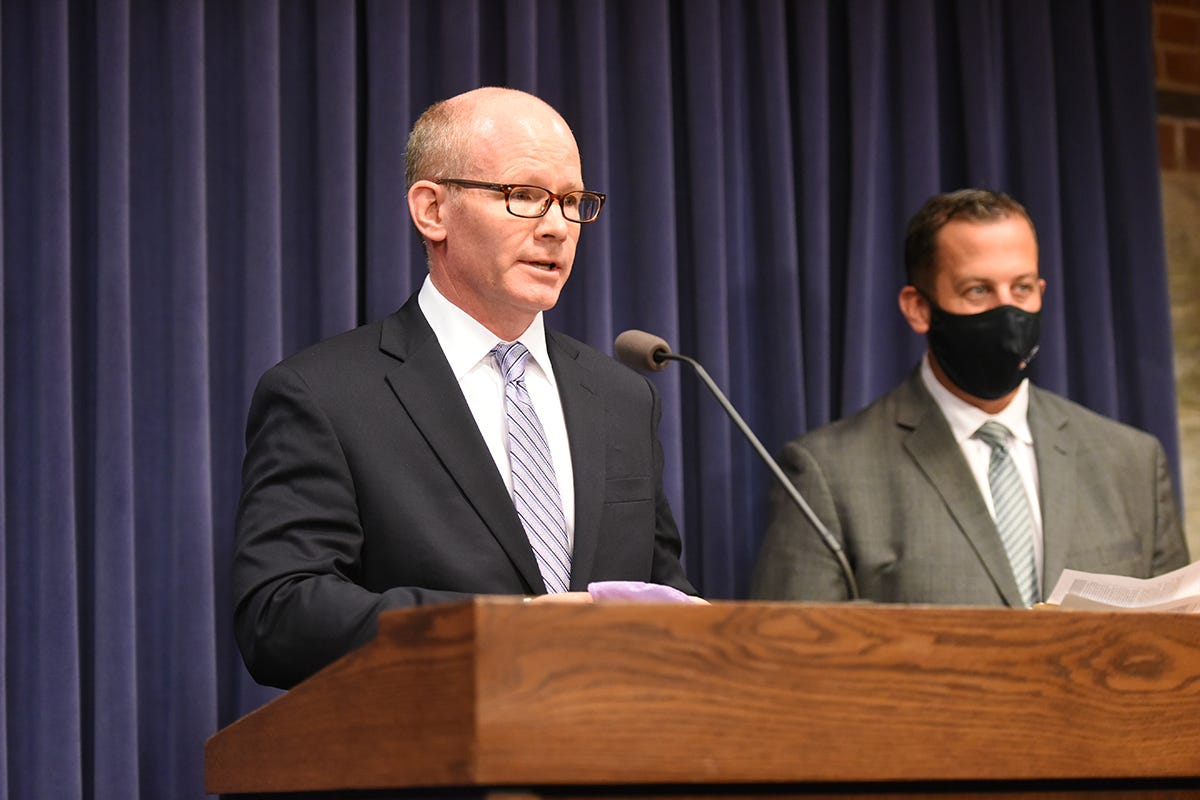THE ILLINOIZE: Thursday Free for All
October 21, 2021
Good morning.
The legislature has canceled session today without passing any really substantive legislation during the first week of the fall veto session.
That means there’s a slew of big stuff potentially on the docket next week. Here was our summary that we sent out Monday morning.
If you aren’t a paid subscriber yet, now is the best time to give it a try. We’re offering a free month with a year subscription and if you don’t like it, you don’t have to pay for the full year.
Subscribers have gotten four specific e-mails from us in the past six days. Don’t you want to be in the know? Click below to join us.
As always, drop me a note with any questions or comments that you may have. My email is patrick@theillinoize.com.
Let’s get to it.
YOUR THURSDAY FREE FOR ALL
(note: we’re not responsible for paywalls and restrictions from other news outlets)
COVID-19 case positivity at lowest point since mid-July in Illinois (Daily Herald)
A key COVID-19 metric has dropped to its lowest level in more than three months and hospitalizations from the respiratory illness are down nearly 15% from a week ago.
Illinois Department of Public Health data released [Wednesday] shows the state's seven-day case positivity level at 1.9%, the lowest it's been since July 16. Case positivity is the percentage of new cases derived from a batch of tests and is one of the metrics used by health officials to determine the level of precautions necessary to avoid more cases.
IDPH officials also reported 1,382 COVID-19 hospitalizations, 14.4% fewer than just one week ago.
Of those hospitalized, 350 are in intensive care.
IDPH officials also reported 36 more COVID-19 deaths, as well as 2,447 new cases of the disease.
Related: 'I am tired. We are tired': A Letter from a COVID-19 ICU doctor (Daily Herald)
Advocate Aurora fires 440 workers who refuse to get COVID shots (Chicago Sun-Times)
Chicago police union official likens vaccine standoff with Mayor Lightfoot to ‘The Hunger Games,’ as city seeks to expand restraining order against FOP (Chicago Tribune)
Opinion: Fire the cops who won’t comply with Chicago’s vaccine mandate (Chicago Tribune)
Rural Illinois doesn’t have enough health workers, and the pandemic made it worse (St. Louis Public Radio)
Senate leader: Court recognized lawmakers 'did what we could' to pass new district maps (State Journal-Register)
The Illinois Senate’s president says Tuesday’s decision by federal judges to use Democrats’ amended September map for new state legislative districts as a “starting point” for future court debate on redistricting was a recognition of lawmakers’ hard work this year.
“I am gratified that the court recognized that the General Assembly, in unique and unprecedented circumstances, did what we could in May to fulfill our constitutional obligations and did what we should do in September to ensure our maps are constitutional,” Senate President Don Harmon, D-Oak Park, said.
Harmon’s comments came after a three-judge panel from the U.S. District Court’s Chicago-based Northern District of Illinois declared unconstitutional the redistricting map passed by the Democratic-controlled General Assembly in May but let stand, for now, the amended map Democrats passed in August and was signed into law last month by Gov. JB Pritzker.
That’s clever spin, but I’d be interested to hear Harmon’s response to the suits brought by the Mexican American Legal Defense and Education Fund (MALDEF) and the NAACP in East St. Louis alleging racial bias in the September map.
Related: Federal Court Throws out June Legislative Map, September Rewrite Up in the Air (The Illinoize)
Opinion: What we're getting versus what we could have had (Champaign News-Gazette)
Heavy workload expected next week as lawmakers cancel Thursday session (Capitol News Illinois)
The legislative action was light during the General Assembly’s first week of fall session, and lawmakers in both chambers left town a day early after leadership canceled the Thursday session.
That means bigger items, such as a vote on congressional maps and potential changes to the Health Care Right of Conscience Act and a repeal of the Parental Notice of Abortion Act, will have to wait until next week for substantive action.
Republicans used the light legislative days to make a case against one of the main Democratic agenda items and to push for some of their own – including public safety reforms and checks on the governor’s power – in a series of news conferences.
On Tuesday, the four women in the House Republican Caucus made clear their opposition to repealing the Parental Notice of Abortion Act, which requires that a physician give 48 hours notice to a parent or guardian of a person under the age of 18 who intends to get an abortion.
The law does not require the guardian to give consent, and doesn’t apply if an adult family member waives the notice in writing. Additionally, there are exceptions for minors who are victims of physical or sexual abuse or neglect by an adult family member, if the minor is married or emancipated, or if the provider determines there is a medical emergency. A judge can also waive the requirement.
Sen. Sue Rezin, R-Morris, characterized the issue as one of parents’ rights that is independent of “the typical pro-life vs. pro-choice debate.” Parents should have a right to know when their child is going to undergo a major medical procedure such as an abortion, the GOP senators argued.
Sen. Sally Turner, R-Beason, said repealing the parental notice requirement “will not help the minor but may harm the minor.” She said a repeal would “make it easier for sexual predators and sex traffickers to abuse our children.”
The ACLU of Illinois countered that claim Wednesday in a news release, circulating a letter cosigned by several groups that aid sexual assault victims, such as the Chicago Alliance Against Sexual Exploitation.
“Repealing the Parental Notice of Abortion Act in Illinois would not result in more child trafficking,” the groups wrote in the letter. “It would also not impact the ability for child trafficking victims to be identified.”
They said the Republican claims “rely on an erroneous belief that parents and/or social networks are always safe and healthy individuals in a young person’s life and that, if notified, they would assist in an intervention to help the young person.”
As Pritzker administration pushes for nursing home reform, report details weaknesses in oversight (Illinois Public Radio)
In the early days, weeks and months of the pandemic, COVID-19 ravaged nursing homes, killing thousands of elderly and frail residents and forcing the isolation of thousands more.
Though long-term care facilities statewide locked down, forbidding outside visits from family members, staff from the Illinois Department of Public Health charged with investigating complaints of abuse and neglect should still have been going in to those facilities.
But for the first three and a half months of the pandemic, they weren’t. Pritzker’s administration admitted to that error last summer after severing ties with two IDPH officials and catching up on the 272 missed abuse and neglect complaints, substantiating 17 of them. The agency hired a former federal prosecutor to review the unsubstantiated claims.
“Our top priority as a regulator of long-term care facilities in Illinois is ensuring vulnerable Illinoisans are kept safe by those responsible for their care,” IDPH Director Ngozi Ezike said in a course-correcting news release last August. “Anything short of that is unacceptable, and our entire department is committed to getting this right as we move forward.”
In service of that goal, IDPH also paid $425,000 to an outside firm to examine what went wrong inside the agency and how its processes could be improved to prevent such a major dereliction of duty from happening again.
More than 13 months later, however, the report remains unpublished, though it’s been complete since Nov. 30, 2020. A copy obtained by NPR Illinois shows the outside review was critical of IDPH, its Bureau of Long Term Care and the Office of Health Care Regulation directly responsible for investigating nursing home abuse and neglect complaints.
But as Pritzker and some Democrats in the General Assembly attempt to overhaul how the state reimburses nursing homes with Medicaid patients — a move they say will engender more accountability and equity — the report paints a complicated picture that neither fully bolsters Pritzker’s argument for an overhaul nor the resistance from the nursing home industry warning its cash-poor facilities will close en masse.
SOME TOP LINKS FROM THE WEEK SO FAR
JOIN US












